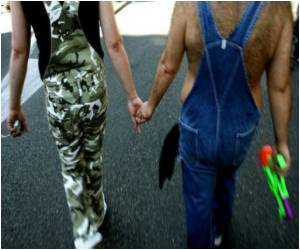Lesbians from across Europe have arrived at the village of Eressos on Greece's Lesbos island has for a unique international festival for women.

Over the past decade, attendance at the two-week International Women?s Festival has jumped from 30 to hundreds of women -- mainly German, British, Dutch and Scandinavian, but also Greek and Italian.
The busy programme of events includes women-only walks and sunset cruises, breathing and drumming workshops, Greek dance classes and lesbian film screenings.
"I've been blown away, there's no unease at all," says Lauren Bianchi, a Scottish woman in her early 20s who is at the festival for the first time and who had read articles about difficult relations between locals and lesbians.
In 2000, when the festival launched, tensions ran high.
A poster advertising one of its events sparked the anger of the village mayor, who threatened to take the organisers to court and ban the event, vowing to drive lesbian tourism from the village.
Advertisement
"It was economic gameplay and the lesbians took the ticket and said, 'yes, if you want cash, you've got it?," says Marianthi Lianou, a Greek sociologist in her 50s who moved to Eressos six years ago to study its small lesbian community.
Advertisement
According to the Sappho travel agency, lesbians now make up 60 percent of visitors to the village, rising to 90 percent in September when the festival takes place.
"My rooms are full for the next two weeks. We'd usually be dead in September, but now it's booming," says Andreas, who runs the Sappho cafe bar and rents rooms on the village seafront.
As the economic crisis continues to pinch, he says Greek holidaymakers spent less this summer and he is grateful for the extended season brought by lesbian tourism.
"People in the village have got used it, especially the young people, but the old people still discuss it among themselves," he says.
These days it is the "more conservative" visitors from Athens, who fill the village in August, who feel uneasy about the lesbian visitors, says Lena Tzigounaki, a Greek woman who moved to Eressos from the capital more than 15 years ago.
Tables from her bar spill out onto the village?s main square in the gaze of a large bronze statue of Sappho, one of three erected in the village in recent years.
Like most lesbian-run establishments in Eressos, the rainbow-coloured gay pride flag is on show above the bar.
"When people from Athens see women sitting together, I see whole families looking strange and shocked, but locals don?t find anything unusual in women holding hands, or even kissing," she says.
"But there is a limit, of course," she adds.
Gays in Greece lack many of the basic rights and legal provisions enjoyed in other European countries -- they are still fighting for the recognition of same-sex marriage, access to IVF treatment and the right to adopt.
Hate speech is rife, but in 2005 Greece passed a law to protect employees from discrimination on grounds of sexual orientation and, in the same year, Athens hosted Greece's first Gay Pride parade.
Surveys reflect a shift in public opinion: in 2008 a poll found 48.3 percent of Greeks were against allowing same-sex marriage, compared to 84 percent in another poll by the European commission in 2006.
Despite this, Greek lesbians remain "totally invisible" under Greek law, says Evangelia Vlami, an activist and founder of the non-governmental organisation Lesbians For Equality.
"Without visibility, lesbians lose their sense of who they are, their issues and their problems," she adds.
Source-AFP









